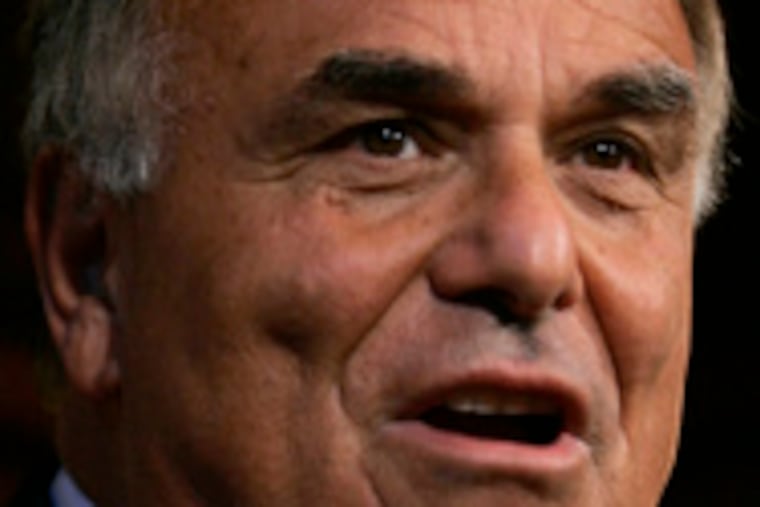For Rendell, a very bumpy ride
HARRISBURG - For four years, Gov. Rendell pushed the Republican-controlled legislature to the brink of a government shutdown over the state budget, but in the end always emerged with a deal that averted it.

HARRISBURG - For four years, Gov. Rendell pushed the Republican-controlled legislature to the brink of a government shutdown over the state budget, but in the end always emerged with a deal that averted it.
This year, Rendell may have misjudged his opposition, and his political hardball tactics did not work as well. With no agreement reached on Sunday night, many state government operations were halted and, for the first time ever, tens of thousands of employees were furloughed.
Late last night, after hours of bitter public rhetoric and private negotiations, Rendell and legislative leaders made a deal that includes no new taxes, sends employees back to work, and reopens government operations.
It seemed that negotiations on this year's $27.3 billion budget should have been easier than in past years. The House is now in Democratic hands and higher-than-expected revenue projections have given the state a $650 million surplus.
But Rendell, using his needed approval of the budget as leverage, sought to get the legislature to enact an ambitious agenda, which included a new energy plan, a smoking ban and transportation funding. It ran into immediate opposition in the Senate.
In the deal, Rendell got the transportation bill, which pours new money into mass transit, but agreed to postpone consideration of his energy plan until September.
In defending his outside-the-budget spending and borrowing plans, Rendell was not reluctant to harken to his landslide reelection in November and his high approval ratings as signs of voter endorsement for his agenda.
But last month, the Rendell mandate collided with the newly empowered anti-tax and open government movement, born out of the 2005 pay raise debacle that propelled 55 new lawmakers into office.
Many of the new lawmakers ran on platforms of fiscal restraint and no new taxes.
"The governor has misread the political landscape," Eric Epstein, founder of the anti-pay raise group Rock the Capital, said before last night's agreement was reached. "I think he believes he has a mandate to pillage, but he won 61 percent of the vote against an empty suit last year and he didn't have a clear agenda until June 30."
The Senate leaders, Majority Leader Dominic Pileggi (R., Delaware) and President Pro Tempore Joseph Scarnati (R., Jefferson), owe their jobs to the uproar over the middle-of-the-night pay raise and the legislative glasnost that has followed it. The two leaders replaced defeated colleagues who supported the pay raise, and they have been determined to avoid new taxes and spending increases.
"We're harvesting the fruits of the reform," Epstein said. "This determination to be fiscally restrained would not have happened without it."
In past impasses, over tax increases and gambling, Rendell has extensively used Community Revitalization Program grants - commonly known as "walking-around money" - to entice votes from lawmakers.
This year, however, the option was not available because legislators scarred by the pay-raise backlash vowed not to put those grants into the budget. "Ed Rendell loves to make a deal, but he has nothing to offer," a former lawmaker who has negotiated with the governor said earlier yesterday.
Rep. John Perzel (R., Phila.), who as speaker of the House helped negotiate budget deals with Rendell in past years, said that this year, the governor initially sought too many tax increases and too much borrowing.
Although Rendell later dropped proposals to increase the sales tax and impose an oil-profits tax, Perzel said the governor presented details of his non-budget initiatives too late for serious consideration.
Republicans who wavered in the standoff with Rendell risked losing in next year's primaries, with strong anti-incumbent sentiment still bubbling in some areas of the state. Already, Young Conservatives of Pennsylvania, an activist group, is running ads aimed at Pileggi and other prominent legislators, reminding them that they are being watched.
And Rendell is a lame duck, so there's less reason for lawmakers to be afraid of him. When he was at the top of the ticket, Republicans from the Pennsylvania suburbs, in particular, were wary of crossing the popular former Philadelphia mayor.
"I think he underestimated the backlash from the pay hike," said G. Terry Madonna, a pollster and political science professor at Franklin and Marshall College. "This is an anti-pay-hike legislature, with 55 new members, new leaders in three out of the four caucuses. In the past, he could trade for things - he'd give the Republicans what they wanted and get what he wanted. But these Republicans won't go there."